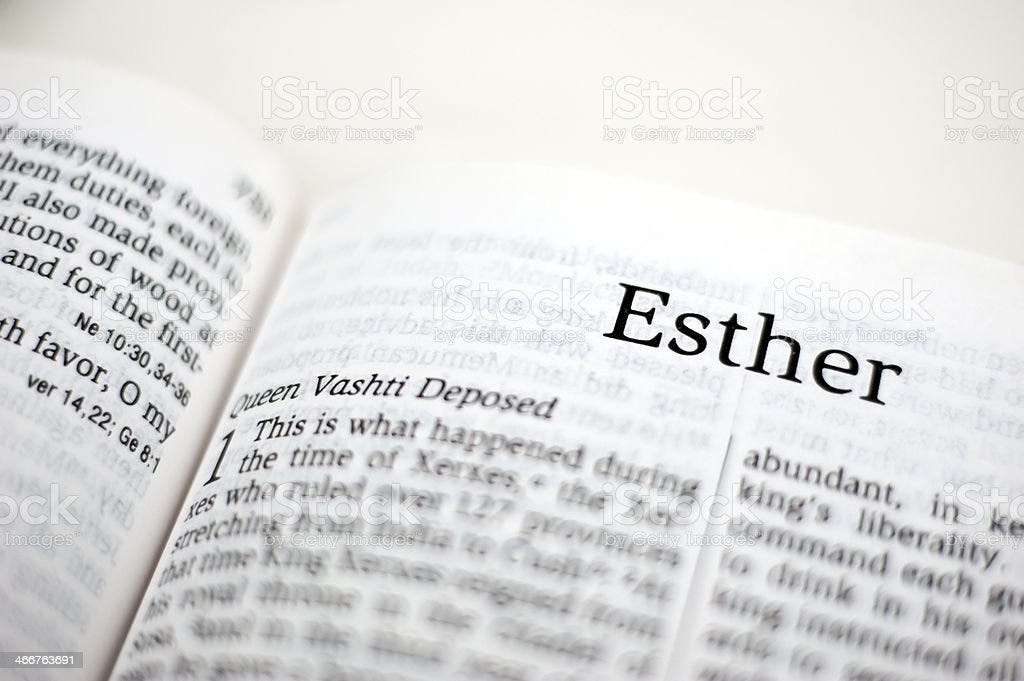For Such a Time as This
Reflecting on the Nineteenth Sunday after Pentecost: One Day after Sunday (Year B)
Scripture
Semi-continuous: Psalm 140; Esther 4:1-17; 1 Peter 1:3-9
Complementary: Psalm 5; Zechariah 6:9-15; 1 Peter 1:3-9
___
Prayer
O God, you declare your almighty power chiefly in showing mercy and pity: Grant us the fullness of your grace, that we, running to obtain your promises, may become partakers of your heavenly treasure; through Jesus Christ our Lord, who lives and reigns with you and the Holy Spirit, one God, for ever and ever. Amen. (Book of Common Prayer)
___
Reflection
When Mordecai learned all that had been done, Mordecai tore his clothes and put on sackcloth and ashes and went through the city, wailing with a loud and bitter cry; he went up to the entrance of the king’s gate, for no one might enter the king’s gate clothed with sackcloth. In every province, wherever the king’s command and his decree came, there was great mourning among the Jews, with fasting and weeping and lamenting, and most of them lay in sackcloth and ashes.
When Esther’s maids and her eunuchs came and told her, the queen was deeply distressed; she sent garments to clothe Mordecai, so that he might take off his sackcloth, but he would not accept them. Then Esther called for Hathach, one of the king’s eunuchs who had been appointed to attend her, and ordered him to go to Mordecai to learn what was happening and why. Hathach went out to Mordecai in the open square of the city in front of the king’s gate, and Mordecai told him all that had happened to him and the exact sum of money that Haman had promised to pay into the king’s treasuries for the destruction of the Jews. Mordecai also gave him a copy of the written decree issued in Susa for their destruction, that he might show it to Esther, explain it to her, and charge her to go to the king to make supplication to him and to entreat him for her people.
Hathach went and told Esther what Mordecai had said. Then Esther spoke to Hathach and gave him a message for Mordecai: “All the king’s servants and the people of the king’s provinces know that, if any man or woman goes to the king inside the inner court without being called, there is but one law: to be put to death. Only if the king holds out the golden scepter to someone may that person live. I myself have not been called to come in to the king for thirty days.” When they told Mordecai what Esther had said, Mordecai told them to reply to Esther, “Do not think that in the king’s palace you will escape any more than all the other Jews. For if you keep silent at this time, relief and deliverance will rise for the Jews from another place, but you and your father’s family will perish. Who knows? Perhaps you have come to royal dignity for just such a time as this.” Then Esther said in reply to Mordecai, “Go, gather all the Jews to be found in Susa, and hold a fast on my behalf, and neither eat nor drink for three days, night or day. I and my maids will also fast as you do. After that I will go to the king, though it is against the law, and if I perish, I perish.” Mordecai then went away and did everything as Esther had ordered him (Esther 4:1-17).
Esther is in a difficult situation, Haman has hatched his plot against the Jews with the king’s approval, and it seems as if there is no one who will be able to save God’s people except for Esther. She is in the best position to do so, but she risks her own life in attempting to so so.
Keep reading with a 7-day free trial
Subscribe to Faith Seeking Understanding to keep reading this post and get 7 days of free access to the full post archives.




